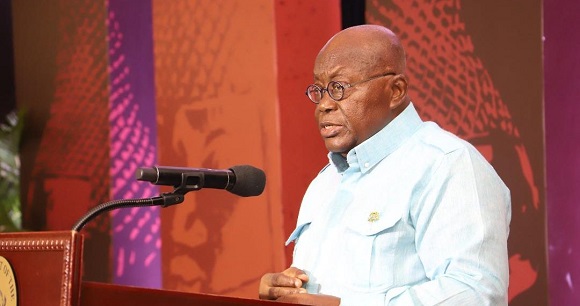President Akufo-Addo has said payments of reparation to victims of the slave trade must accompany the subject of restitution of Africa’s stolen cultural properties and artifacts.
He said even though no amount of money can restore the damage caused by the trans-Atlantic slave trade and its consequences spanning many centuries, payment of reparations must be made to Africans for the inhumane atrocities committed against them.
Speaking at an event organised by the Open Society Foundations Global Initiative for the Restitution of African Cultural Heritage in Accra on Tuesday, President Akufo-Addo insisted that “if reparations can rightfully be paid to the victims of the holocaust, so reparations can be paid to the victims of the slave trade.”
The President said even before these discussions on reparations were concluded, the continent of Africa deserved a formal apology from the European nations involved in the slave trade, which was characterized by the crimes and damage it caused the population, psychic, image and character of Africans.
The Caribbean community has unequivocally announced its demand for the payment of reparation.
President Akufo-Addo said it was now time to revive and intensify the discussions about reparations for Africa, adding: “Indeed, the time is long overdue.”
The President expressed his support to initiate for the return and repatriation of African cultural properties to the continent of Africa.
That, he emphasized, would help Africans and in particular the descendants of the communities, groups and individuals who created and produced these cultural properties, reconnect to their history, their pioneers, their knowledge and their skills.
This reconnection to the past and the present, the President explained, would help to build new relations with the international community, especially that of Europe, which was principally responsible for the original thefts of cultural properties.
Most of these cultural properties, he maintained, when returned, would also offer Africans the opportunity to develop local knowledge of the technological, cultural, social and respected value of the objects.
President Akufo-Addo said the restitution and reparation of stolen African cultural properties under pre-colonial and colonial circumstances must be issues of major concern to all Africans.
These concerns, according to the President, have in recent times, dominated public discourse on the continent.
“Governments, civil society groups, traditional authorities, scholars and researchers have called for the return of African cultural properties that were illegally and shamelessly transported from the continent.”
President Akufo-Addo said Ghana was mindful of the complexities of the repatriation and restitution process as well as the sensitivity of the holders and potential recipients of the legally acquired properties.
As a result, Ghana’s Ministry of Tourism, Arts and Culture had set up a national focal team on restitution and repatriation to research and advice, on international best practices and guidelines, and how it would support the country in the restitution process.
He said the government’s vision was in line with the aspirations of Africa’s agenda 2063, which envisages an Africa with a strong cultural identity, common heritage, shared values and ethics.
“The restitution of cultural properties is not without tension and contestation, as it required the establishment of true ownership and province of the cultural properties to be returned and repatriated,” the President indicated.
To ensure that the restitution and repatriation process do not invoke undue contestation and tension, President Akufo-Addo said it was important for state and non-state institutions, activists’ groups and local community leaders to work in partnership with their international counterparts based on mutual trust and respect.
Countries such as Senegal, Nigeria and Benin have managed successfully to regain possession of some of their cultural properties that were illegally moved out of their territories.
Ghana also has managed to restitute some of her stolen cultural properties and relics.
President Akufo-Addo commended the organisers of the three-day event for calling for the return of African cultural materials, adding: “It is wholly fitting that these deliberations…are held at the W.E.B Du Bois Centre, a place named after the man who championed the freedom and fought for the justice of black people, particularly, African Americans and the Caribbean.
In recent years, the long struggle for the restitution of African heritage which started during colonisation entered a new phase and in 2017, there was a resurgence of movements which urged lawmakers, private collectors and museums to expedite objects illicitly taken from Africa during colonial rule.
It is against this backdrop that the Open Society Foundations Global Initiative for the Restitution of Africa Cultural Heritage convening is focused on interrogating key questions to advance and build a resilient restitution movement.





